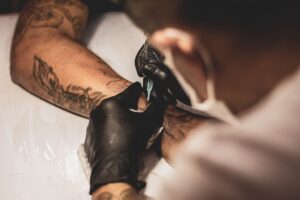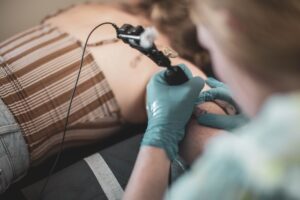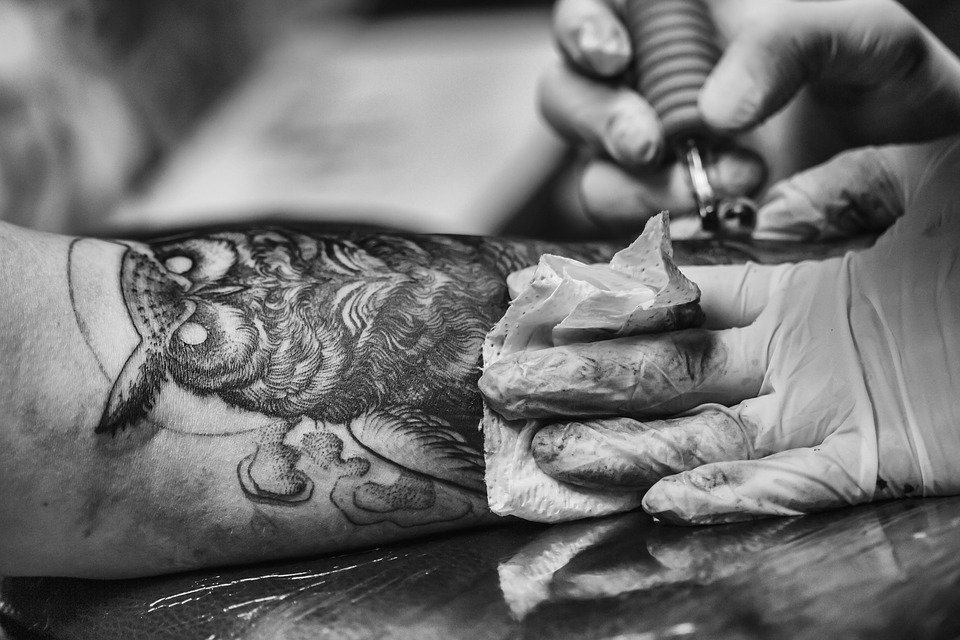
Are you regretting that tattoo you got years ago? Don’t worry; you’re not alone. Many people decide to remove their tattoos for various reasons – a change in personal style, career considerations, or simply wanting a fresh start. But once the decision is made to undergo tattoo removal, it’s important to take steps to ensure a smooth recovery process. In this blog post, we’ll provide you with some helpful tips on how to care for your skin after tattoo removal so that you can achieve the best results possible.
Avoid Scratching or Picking at the Treated Area
 After undergoing tattoo removal, resisting the urge to scratch or pick at the treated area is crucial. While it may be tempting to relieve any itchiness or discomfort, doing so can negatively affect your skin’s healing process. When you scratch or pick at the treated area, you risk not only prolonging the recovery time but also increasing the chances of infection. The skin in that region is already sensitive and vulnerable due to the removal process, so introducing bacteria from your nails or other sources can lead to complications. To avoid scratching or picking, try distracting yourself with activities that keep your hands busy. Engage in hobbies like reading a book, doing puzzles, or playing video games to redirect your attention away from the urge to touch the treated area.
After undergoing tattoo removal, resisting the urge to scratch or pick at the treated area is crucial. While it may be tempting to relieve any itchiness or discomfort, doing so can negatively affect your skin’s healing process. When you scratch or pick at the treated area, you risk not only prolonging the recovery time but also increasing the chances of infection. The skin in that region is already sensitive and vulnerable due to the removal process, so introducing bacteria from your nails or other sources can lead to complications. To avoid scratching or picking, try distracting yourself with activities that keep your hands busy. Engage in hobbies like reading a book, doing puzzles, or playing video games to redirect your attention away from the urge to touch the treated area.
Use Cold Compresses or Ice Packs
Using cold compresses or ice packs can be a helpful way to promote healing and reduce swelling after tattoo removal. It is known that the cold temperature constricts the blood vessels in the treated area. It helps to minimize inflammation and discomfort. When you apply a cold compress or ice pack, wrap them in a thin towel or cloth to protect your skin from direct contact with extreme temperatures. Press it against the treated area for 10-15 minutes, allowing your skin to rest between applications. Cold therapy can provide immediate relief by numbing the area and reducing pain sensations. It also helps prevent excessive bleeding and bruising that may occur after tattoo removal.
Elevate the Area, If Possible
Elevating the treated area can be a simple yet effective way to promote smooth and speedy recovery after tattoo removal. By lifting the area, you can help reduce swelling and improve blood circulation to aid in healing. One way to elevate the area is by propping it up with pillows or cushions. For example, if your tattoo removal was on your arm, you can place a couple of pillows under your arm while sitting or lying down. This helps to minimize fluid accumulation in the area and prevents excessive swelling. Keep the elevated position for at least a few hours each day. This will give ample time for proper drainage of any fluids accumulated during the procedure.
Wear Loose, Breathable Clothing
 Wearing loose, breathable clothing is essential to a smooth recovery after tattoo removal. It’s important to give your skin the space and air it needs to heal properly. Tight or restrictive clothing can cause friction and irritation, which may delay the healing process. Opt for lightweight fabrics like cotton or linen that allow your skin to breathe. These materials help prevent sweat from getting trapped against your skin, reducing the risk of infection. Avoid synthetic fabrics that don’t allow proper airflow.
Wearing loose, breathable clothing is essential to a smooth recovery after tattoo removal. It’s important to give your skin the space and air it needs to heal properly. Tight or restrictive clothing can cause friction and irritation, which may delay the healing process. Opt for lightweight fabrics like cotton or linen that allow your skin to breathe. These materials help prevent sweat from getting trapped against your skin, reducing the risk of infection. Avoid synthetic fabrics that don’t allow proper airflow.
Remember that everyone’s experience with tattoo removal may vary depending on factors such as their overall health, type of tattoo ink used, size of the tattoo, and individual healing capabilities. Consulting with a professional dermatologist throughout your recovery journey is highly recommended. Do you have any tips to share? Let us know in the comments.

 Ever had a tattoo that you already want to have removed? Maybe it is from a dare from your peers or even a tattoo that has never looked the way you envisioned it. There are already a lot of ways to have it removed. Traditionally, ways to remove a tattoo is through surgical intervention. It includes removal of the tattooed skin and restitching to create a cleaner look, a downside of this procedure is that it may leave scars or even keloid formation.
Ever had a tattoo that you already want to have removed? Maybe it is from a dare from your peers or even a tattoo that has never looked the way you envisioned it. There are already a lot of ways to have it removed. Traditionally, ways to remove a tattoo is through surgical intervention. It includes removal of the tattooed skin and restitching to create a cleaner look, a downside of this procedure is that it may leave scars or even keloid formation.